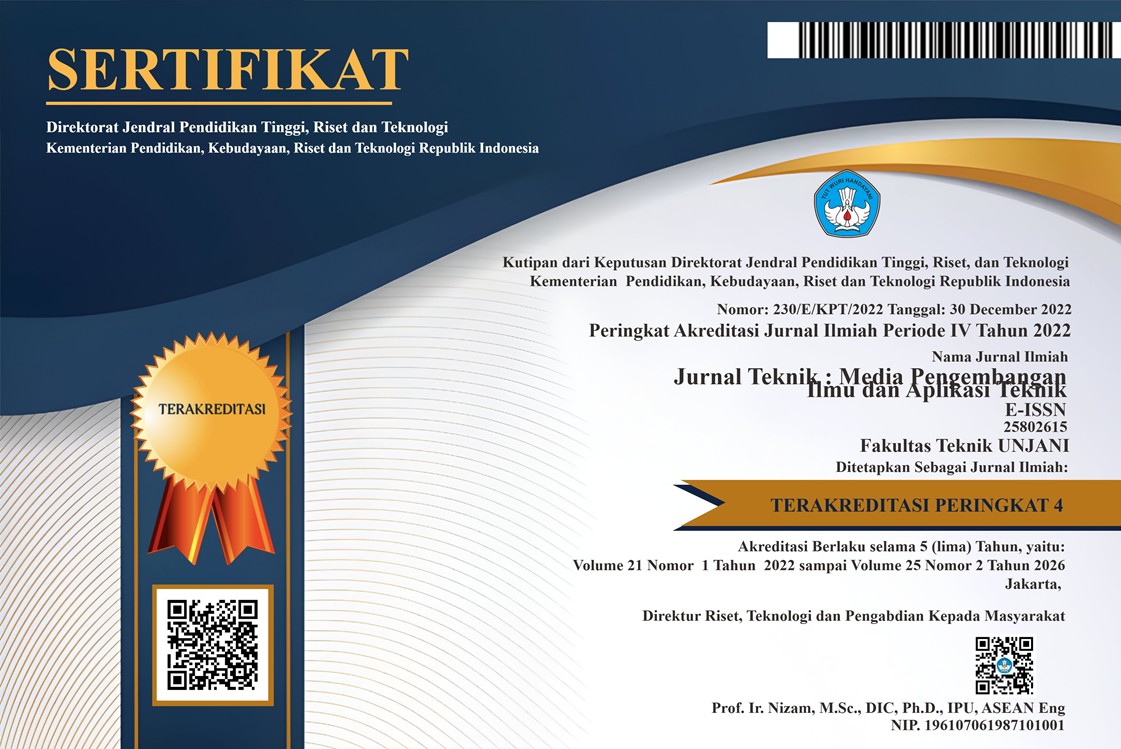Penjadwalan Dinamis Menggunakan Metode Rolling Time Window (RTW) pada Kasus Flowshop 3 Mesin untuk Meminimumkan Total Biaya Lateness, Earliness dan Re-Scheduling
DOI:
https://doi.org/10.55893/jt.vol22no2.427Keywords:
rolling time window, dynamic scheduling, flowshopAbstract
This study discusses the problem of job scheduling in a three-machine flowshop to minimize the total cost of lateness, earliness, and rescheduling. This research takes a real system from one of the manufacturing companies engaged in the machining operations of various components. There are 12 jobs with different arrival patterns and due dates. The company uses the first-in, first-out (FIFO) scheduling method and gets the result that some products finish early and some finish late. This study tries to improve the company's scheduling performance by proposing a rescheduling using the rolling time window (RTW) method. Although it is relatively small, scheduling results show an improvement in company performance as measured by the total cost of earliness, lateness, and rescheduling, although it is relatively small (3%). This improvement is obtained by suggesting the company reschedule every 15 days by evaluating the length of the window per 30 days. The company can still use the FIFO method used by the company considering the characteristics of the jobs that come to it are still under control. The company is deemed capable of making agreements with consumers regarding the delivery deadline, making the job queues on the production floor less crowded.
References
Ilhami, M. A. (2014). Pengembangan Model Penjadwalan Dinamis Flexible Flow Shop 3-Stages untuk Meminimasi Weighted Tardiness dengan Sistem Lelang. Seminar Nasional IENACO-2014, 363–373. http://publikasiilmiah.ums.ac.id/handle/123456789/4538
Mohan, J., Lanka, K., & Rao, A. N. (2019). A review of dynamic job shop scheduling techniques. Procedia Manufacturing, 30, 34–39. https://doi.org/10.1016/j.promfg.2019.02.006
Nurainun, T. (2012). Penjadwalan Batch pada Flow Shop Dinamis untuk Meminimasi Biaya Produksi. Prosiding Seminar Nasional ReSaTek II-2012. 1–13.
Octanatry, D., Ilhami, M. A., & Herlina, L. (2015). Pengembangan Model Penjadwalan Dinamis Mesin Paralel dengan Sistem Lelang untuk Meminimasi Weighted Tardiness (Studi Kasus di PT . XYX). Jurnal Teknik Industri Untirta, 3(3). 1-7
Suharyanti, Y., & Halim, A. H. (2000). Model penentuan panjang time window pada penjadwalan job shop dinamik. Jurnal Teknologi Industri, 4(4), 217–228.
Sun, D., & Lin, L. (1994). A dynamic job shop scheduling framework: A backward approach. International Journal of Production Research, 32(4), 967–985. https://doi.org/10.1080/00207549408956982
Yusriski, R., Astuti, B., Ilham, M., & Zahedi. (2019). Integrated Batch Production and Multiple Preventive Maintenance Scheduling on A Single Machine to Minimize Total Actual Flow Time. IOP Conference Series: Materials Science and Engineering, 598(1), 1–8. https://doi.org/10.1088/1757-899X/598/1/012083
Yusriski, R., Astuti, B., Sukoyo, Samadhi, T. M. A. A., & Halim, A. H. (2015). Integer Batch Scheduling Problems for a Single-Machine to Minimize Total Actual Flow Time. Procedia Manufacturing, 2(February), 118–123. https://doi.org/10.1016/j.promfg.2015.07.021
Yusriski, R., Samadhi, T. M. A. A., & Halim, A. H. (2014). Batch Scheduling for a Single Machine with Forgetting Effect to Minimize Total Actual Flow Time. Proceedings of the Asia Pacific Industrial Engineering & Management Systems Conference 2014. 1(October). 2055-2060
Yusriski, R., Sukoyo, S., Ari Samadhi, T. M. A., & Halim, A. H. (2015). Integer batch scheduling problems for a single-machine with simultaneous effects of learning and forgetting to minimize total actual flow time. International Journal of Industrial Engineering Computations, 6(3), 365–378. https://doi.org/10.5267/j.ijiec.2015.2.005
Yusriski, R., Sukoyo, Samadhi, T. M. A. A., & Halim, A. H. (2016). An Integer Batch Scheduling Model for a Single Machine with Simultaneous Learning and Deterioration Effects to Minimize Total Actual Flow Time. IOP Conference Series: Materials Science and Engineering, 114(1). https://doi.org/10.1088/1757-899X/114/1/012073
Yusriski, R., Sukoyo, Samadhi, T. M. A. A., & Halim, A. H. (2018). An integer batch scheduling model considering learning, forgetting, and deterioration effects for a single machine to minimize total inventory holding cost. IOP Conference Series: Materials Science and Engineering, 319(1). https://doi.org/10.1088/1757-899X/319/1/012038
Additional Files
Published
Issue
Section
License
Copyright (c) 2023 Rinto Yusriski, Budi Astuti, Andri Rachmat Kumalasian Nasution

This work is licensed under a Creative Commons Attribution-NonCommercial-ShareAlike 4.0 International License.
Penulis yang menyerahkan artikel di Jurnal Teknik: Media Pengembangan dan Aplikasi Teknik untuk keperluan publikasi telah mengetahui bahwa Jurnal Teknik: Media Pengembangan dan Aplikasi Teknik memberikan akses terbuka terhadap konten untuk mendukung pertukaran informasi mengenai ilmu pengetahuan, sesuai dengan penerbitan daring yang berbasis Open Access Journal dan mengikuti Creative Commons Attribution 4.0 International License. Sehingga penulis setuju dengan ketentuan-ketentuan berikut:
1. Penulis memegang hak cipta dan memberikan hak publikasi pertama kepada pihak jurnal dengan pekerjaan secara bersamaan
di bawah Creative Commons Attribution 4.0 International License yang memungkinkan orang lain untuk berbagi pekerjaan
dengan pengakuan kepengarangan karya dan publikasi pertama artikel tersebut di Jurnal Teknik: Media Pengembangan dan
Aplikasi Teknik.
2. Penulis dapat melakukan perjanjian tambahan untuk hak distribusi non-eksklusif artikel yang telah diterbitkan di jurnal ini
(misalnya, posting ke sebuah repositori institusi atau menerbitkannya dalam sebuah buku), dengan mengakui bahwa
publikasi pertama dilakukan di Jurnal Teknik: Media Pengembangan dan Aplikasi Teknik.
3. Penulis diizinkan dan didorong untuk menyebarkan karya mereka secara daring (misalnya, dalam repositori institusi atau
laman web penulis) setelah artikel terbit (proses penerbitan artikel selesai). Hal ini terkait dengan imbas dari pertukaran
informasi yang produktif (Lihat Pengaruh Open Access).












